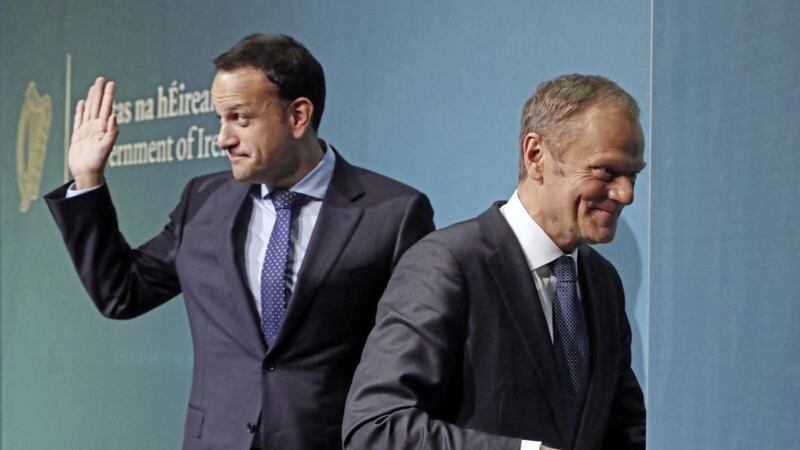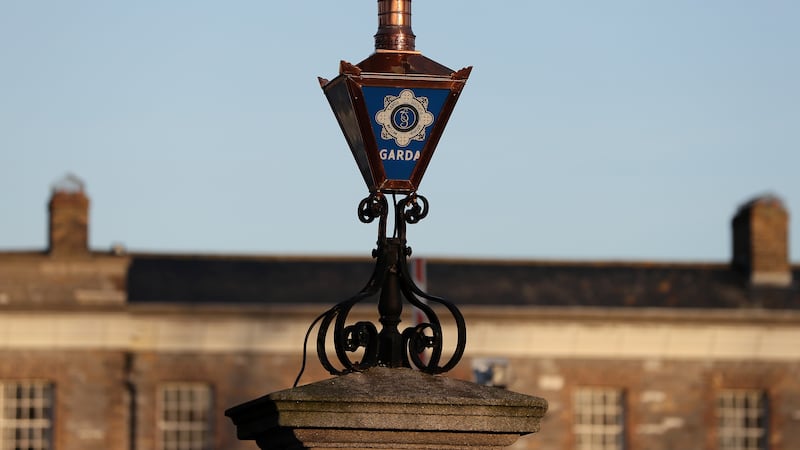Taoiseach Leo Varadkar has said the EU will enter into Brexit negotiations with an open and constructive outlook.
At a joint appearance in Dublin with European Council president Donald Tusk, Mr Varadkar said: "I welcome the European Union's assurance that we enter the negotiations with an open and positive, constructive mind that will allow for a possible evolution of the UK position in the future, allowing ours to evolve as well."
Mr Varadkar thanked the EU for its support for Ireland's position regarding Brexit an the impact on the border.
Responding to Chancellor Philip Hammond's call on Wednesday for a bespoke free trade agreement (FTA) including financial services, Mr Tusk said: "In the FTA we can offer trade in goods with the aim of covering all sectors, subject to zero tariffs and no quantitative restrictions.
"But services are not about tariffs. Services are about common rules, common supervision and common enforcement, to ensure a level playing field, to ensure the integrity of the single market and ultimately also to ensure financial stability.
"This is why we cannot offer the same in services as we can offer in goods. It's also why FTAs don't have detailed rules for financial services.
"We should all be clear that, also when it comes to financial services, life will be different after Brexit."
If in London someone assumes that the #Brexit negotiations will deal with other issues first, before moving to the Irish issue, my response would be: Ireland first.
— Donald Tusk (@eucopresident) March 8, 2018
Responding to Mr Hammond's assertion that it was in the interest of both Britain and EU to ensure that UK-based financial services companies had easy access to the single market, Mr Tusk said: "I fully respect the chancellor's competence in defining what is in the UK's interest. He must allow us to define what is in the EU's interest."
Mr Varadkar said that his preference was "to avoid a hard border through a wider future relationship between the United Kingdom of Great Britain and Northern Ireland and the European Union".
"We are committed to playing our part in exploring this option or alternative specific solutions in a way that respects the structure of these negotiations," he said.
"That will of course require further detailed progress to be put forward by the UK government.
"However, we must have certainty that if a better option proves unachievable, the backstop of maintaining full alignment in Northern Ireland with the rules of the single market will apply, in order to protect the North's co-operation and avoid a hard border."
Mr Tusk warned against "backsliding" on the agreement reached between the UK and EU in December, which included provisions for full regulatory alignment between Northern Ireland and the Republic if no better solution could be found to keep the border open.
"We have to be clear that any backsliding on the commitments made so far would create a risk to further progress in Brexit negotiations," he said. "This applies also to the question of avoiding a hard border.
"When I was in London last week, I heard very critical comments by Prime Minister May and others about the way the Irish border issue was presented in the draft withdrawal agreement.
"We know today that the UK government rejects a customs and regulatory border down the Irish Sea, the EU single market and the customs union.
"While we must respect this position, we also expect the UK to propose a specific and realistic solution to avoid a hard border.
"As long as the UK doesn't present such a solution, it is very difficult to imagine substantive progress in Brexit negotiations. If in London someone assumes that the negotiations can deal with other issues first before the Irish issue, my response would be: Ireland first."








